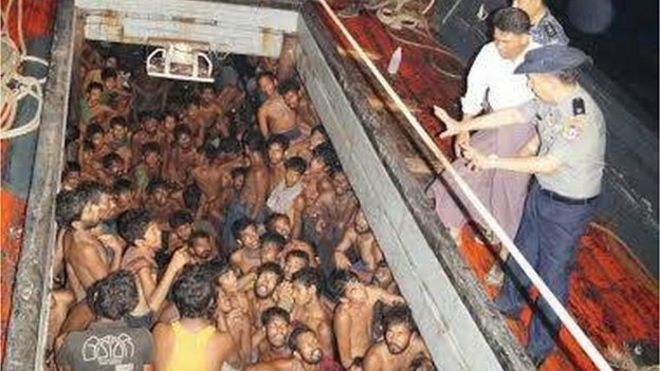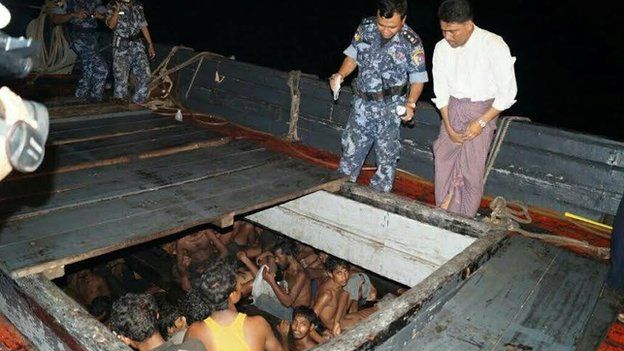Twisting the ‘lessons of history’ to authorise unjustifiable violence: the Mediterranean crisis
By Various Contributors
Source: open democracy
May 21, 2015
More than 300 slavery and migration scholars respond to those advocating for military force against migrants attempting to cross the Mediterranean. This is no slave trade. Where is the moral justification for actions that cost lives?
European Union political leaders have announced that their response to the staggering loss of life amongst migrants crossing the Mediterranean in unseaworthy vessels will be the use of force to smash the so-called ‘networks’ that operate out of Libya to orchestrate the perilous sea crossings. How? On May 11, EU foreign policy chief Federica Mogherini stated that “No one is thinking of bombing. I’m talking about a naval operation,” but two days later, the Guardian reported on a leaked strategy paper for an EU mission in the Mediterranean and in Libyan territorial waters proposing an air and naval campaign. This, the paper said, would lead to ‘collateral damage’. In other words, adults and children boarding or aboard the vessels under attack might be killed. With or without bombs, such ‘collateral damage’ is already a known product of the measures being employed by the EU to push back, deter, and divert migrants, including those seeking asylum.
Where is the moral justification for some of the world’s richest nations employing their naval and technological might in a manner that leads to the death of men, women and children from some of the world’s poorest and most war torn regions? A dangerous perversion of history is being peddled to answer this question.
In recent years, policy on unauthorized movement across borders has drawn a distinction between the activities of ‘people smugglers’ and those of ‘human traffickers’. Smuggling involves voluntary, consensual arrangements, but trafficking is said to entail coercion or deception, and has been repeatedly likened to the transatlantic slave trade by politicians, journalists, and even some contemporary anti-slavery campaigners. The dangers of the analogy are now made manifest, with the terms ‘smuggling’ and ‘trafficking’ being employed interchangeably in relation to migrants crossing the Mediterranean. And it is this elision that makes it possible for EU leaders to discuss the use of military force on the North African coast as if it were a moral necessity. “Human traffickers are the slave traders of the 21st century, and they should be brought to justice”, Italian Prime Minister Matteo Renzi recently wrote. When the problem is framed in this way, their vow to “identify, capture and destroy” the vessels of those who move migrants looks like a ‘tough choice’ forced upon EU leaders by the sudden appearance of a far greater evil—a modern slave trade.
But this is patently false and entirely self-serving. As scholarship on the history of slavery makes painfully clear, what is happening in the Mediterranean today does not even remotely resemble the transatlantic slave trade. Enslaved Africans did not want to move. They were held in dungeons before being shackled and loaded onto ships. They had to be prevented from choosing suicide over forcible transportation. That transportation led to a single and utterly appalling outcome—slavery.
Today, those embarking on the journey to Europe want to move. If they were free to do so, they would be taking advantage of the flights that budget airlines operate between North Africa and Europe at a tiny fraction of the cost of the extraordinarily dangerous sea passage. And it is not ‘slavers’ or ‘traffickers’ who are preventing them from accessing this safe route.
Full article: https://zcomm.org/znetarticle/twisting-the-lessons-of-history-to-authorise-unjustifiable-violence-the-mediterranean-crisis/
A Migrant's Journey Begins
West African family heartbroken after sending child on treacherous journey to seek a better life in Europe.
By Nicolas Haque
http://www.democraticunderground.com/1016122864
The Boat Of Starving Rohingya Refugees That No Country Will Take In
The emaciated faces of hundreds of refugees found adrift in Thai waters on Thursday spoke volumes about the scale of the humanitarian crisis unfolding in South Asia.
Reporters on Thursday found about 400 refugees from Myanmar's Muslim Rohingya minority crammed aboard a wooden fishing boat in the Andaman Sea, desperate for food and water.
The refugees said they had been at sea for almost three months and had fled persecution in their home country. They had hoped to reach Malaysia but were turned away by Malay authorities. Six days ago, smugglers abandoned their ship, and ten people had already perished onboard, refugees said.
Christophe Archambault, a photographer for Agence France Presse, captured the harrowing scenes onboard the ship, and the desperate scramble for supplies that were eventually dropped by the Thai military.
http://www.democraticunderground.com/1016122396
Trapped in Libya: the flotsam of the West’s wars
By Vijay Prashad
Source: al-Araby
May 14, 2015
Next week, the EU will launch work on its plan to tackle the Mediterranean migrant crisis. The EU foreign policy chief Federica Mogherini has asked the UN for help to dismantle the smuggling networks.
European ambassadors have drafted a UN resolution, under chapter VII (which allows use of force), to tackle the crisis. For them the military option is the brightest light. As Mogherini said, the EU wants the authority to “use all necessary means to seize and dispose of the vessels.
“Thus far in 2015, over 60,000 people have tried to cross from Libya to Europe. Of them, close to two thousand have died – a death toll 20 times higher than in 2014,” it continues.
http://www.democraticunderground.com/1016122247
Baroud - The Arab Boat - It’s an Arab-Palestinian Nakba, and We Are All Refugees
by Ramzy Baroud / May 13th, 2015
War and conflicts have resulted in the displacement of 38 million people, of whom 11 million were displaced last year alone. This number is constantly fortified by new refugees, while the total number of people who flee their homes every single day averages 30,000, a third of those are Arabs who flee their own countries.
Yes, 10,000 Arabs, are made refugees every day according to IDMC. Many of them are internally displaced people (IDPs), others are refugees in other countries, and thousands take their chances by sailing in small boats across the Mediterranean. Thousands die trying.
“I am a Syrian refugee from the Palestinian al-Yarmouk camp in Damascus,” wrote Ali Sandeed in the British Guardian newspaper. “When I was small, my grandmother used to tell us how she felt when she was forced to flee to Syria from her home in Palestine in 1948, and how she hoped that her children and grandchildren would never have to experience what it feels like to be a refugee. But we did. I was born a Palestinian refugee, and almost three years ago I became a refugee once more, when my family and I had to flee the Syrian war to Lebanon.”
Full article: http://dissidentvoice.org/2015/05/the-arab-boat/
http://www.democraticunderground.com/1016122246
The wretched of the sea: An Algerian perspective
By Hamza Hamouchene
Source: Middle East Eye
May 10, 2015
Thousands of people, mainly from Africa and Syria, risk their lives every year crossing the sea in fragile boats to flee war-torn areas, poverty, persecution and misery in order to reach the shores of Europe for a better and safer life. Sadly a significant number of them perish in the attempts to do so or end up in humiliating camps and prisons in southern European countries only to be deported and returned and see their dreams shattered.
What distinguishes this year’s tragedy from the previous ones is the sheer scale of it as the death toll of drowning this year now stands at over 1,500 – 50 times more than at the same point in 2014. This can be explained mainly by the ongoing conflicts in Syria, Libya and Mali as well as the inhumane decision by several European Union (EU) governments to refuse funding to the Italian-run rescue operation Mare Nostrum, preferring thus to let migrants die, something that was claimed would act as a deterrent for unwanted people who are trying to reach fortress Europe.
Full article: https://zcomm.org/znetarticle/the-wretched-of-the-sea-an-algerian-perspective/
http://www.democraticunderground.com/1016121954
Behind Every Refugee Stands an Arms Trader
by Jan Oberg / April 28th, 2015
“Seeking a better life”?
It’s plain nonsense. The issue is not what they flee to but what they flee from. Refugees are on the run from some version of hell.
Civilisation: What about this instead?
Imagine EU leaders had instead stated something like this:
Further, we shall increasingly put up arms embargoes instead of intensifying arms deliveries to these and future conflict areas.”
But there are taboos on such common sense ideas in all the countries which consider themselves civilised compared with the morally weak and uncivilised countries they destroy, one after the other.
http://www.democraticunderground.com/1016121383
Myanmar rescues two migrant boats at Bangladesh border

Myanmar's Information Ministry said on its Facebook page that the boats were found in Bangladeshi waters
Most stranded migrants are Rohingya fleeing persecution in Myanmar; others are economic migrants from Bangladesh.
More than 3,000 have landed in neighbouring Malaysia, Thailand and Indonesia, which have offered aid.
Myanmar, also known as Burma, said these migrants were rescued on Friday morning.
Malaysia and Indonesia have agreed to stop towing boats out to sea and will provide temporary shelter to those who have landed.
Thailand only said it would stop rejecting boats.

The Facebook posts referred to the migrants as 'Bengalis' - Myanmar's term for Rohingya Muslims
Full article: http://world.einnews.com/article/266819079/11fhvs9IxiSuSE-B
